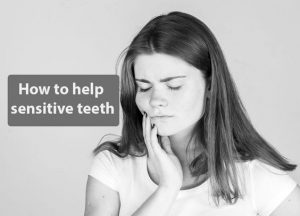Ouch! You just took a sip of your favorite drink and now experiencing a sharp pain through your teeth or it’s your favorite hot or cold dish that’s setting off these pains. Either way, you may have sensitive teeth.
Several factors could trigger tooth sensitivity pain, including receding gums, teeth whitening, tooth decay, or genetics. However, there are ways to relieve your pain. In this post, we’ll share 5 ways to get rid of tooth sensitivity.
- Use toothpaste made for sensitive teeth
- There are plenty of brands, such as Clinproo 5000 or Sensodyne, that are designed to help people with sensitive teeth. Look for the ingredient potassium nitrate, which helps combat tooth sensitivity and stop the pain. Combine your toothpaste with a mouth rinse with stannous fluoride to desensitize your teeth better.
- Swap out your toothbrush and habits
- The way you brush and type of toothbrush you can use can aggravate your teeth sensitivity, so it’s crucial you take a hard look at your brushing habits. Be sure you’re using a soft-bristled toothbrush while gently brushing your teeth. Aggressive brushing with hard bristles will contribute to receding gums, exposing your sensitive teeth and wearing away enamel, increasing sensitivity.
- Avoid acidic foods and drinks
- The Mayo Clinic reports acidic foods and drinks, such as coffee and citrus fruits, can dissolve your enamel, thus creating teeth sensitivity. Try to avoid those acidic foods altogether, but we understand it’s hard to give up your morning coffee. Instead, try to limit your exposure to these by drinking through a straw. Also, by drinking a glass of milk after acidic foods it will help neutralize the acid.
- Nightguard
- Do you grind or clench your teeth at night? If so, this will cause you to wear away your tooth enamel, making your teeth sensitive and sore. At First Impressions Family Dentistry, we can make you a customized night guard. This is molded to your smile, cushioning and protecting your teeth from the nightly grinding and clinching.
- See your dentist
- In the end, Dr. Wells, can help you! Be sure to visit every six months to ensure Dr. Wells can go over any treatment to help with your sensitivity.

